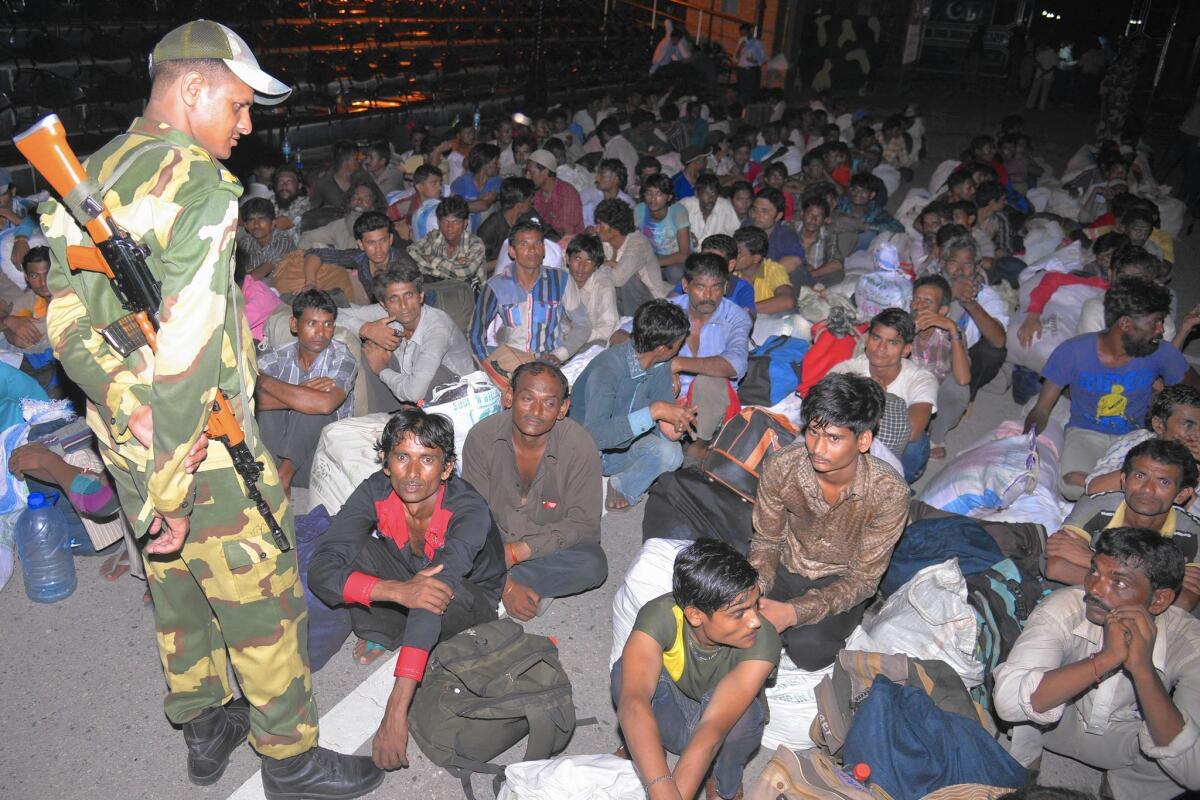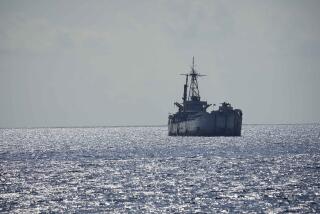Indian fishermanâs death points up perils of straying into disputed waters

Fishermen from India and Pakistan risk gunfire and arrest for straying across a disputed sea boundary. Scores wait in Wagah, on the Indian-Pakistani border, after being released by Pakistan.
Reporting from MUMBAI, India â The shock of nearly losing his life at sea was still fresh when Indian fisherman Pravin Mamoria was detained by his nationâs coast guard while attempting to return to land.
Mamoriaâs trawler had come under fire from an unidentified boat near the disputed maritime boundary between India and Pakistan, and one fisherman on board was killed. Mamoria and the four surviving members of his crew were unharmed, but coast guard officers accused him of being responsible for the manâs death.
âOne put a gun to my head and two kept beating me up for an hour,â Mamoria recalled.
The five men were eventually released and cleared of wrongdoing, but the Sept. 18 incident underscored the confusion and danger lurking in the disputed waters separating India and Pakistan.
Security forces on both sides closely watch the maritime boundary in the Arabian Sea, part of a territorial battle between the rival nations that includes a contentious land dispute in the northern region of Kashmir. In the waters off Gujarat state in India and Sindh province in Pakistan, hundreds of fishermen from both countries have been taken into custody and some have been fired upon, reportedly for straying across the maritime border.
The fishermen and Indian police officials said the vessel that fired on the trawler Friday morning was positioned on the Pakistani side of the boundary but did not bear the markings of Pakistanâs marine security forces. The men aboard were not wearing military uniforms, they said.
Pakistani officials denied involvement in the shooting, leaving it unclear who was responsible. Advocacy groups say some instances of fishermen coming under fire go unreported, and it is not always easy to determine who launched an attack.
âWe thought the other boat was a fishing trawler as well,â said Mamoria, 29. âBut suddenly they started firing at us. We immediately thought of our survival and turned back.â
About 200 Indian fishermen and 800 boats are in Pakistani custody, and India holds 18 Pakistani fishermen and almost 170 boats, said Jatin Desai, general secretary for the Indian chapter of the Pakistan-India Peoplesâ Forum for Peace and Democracy, a group that promotes closer ties between the countries. When fishermen are freed, their boats are often not returned.
Desai said India and Pakistan should adopt âa no-arrest policyâ because the fishermen, mostly small-time operators who lack adequate navigation systems, tend to violate the boundary unwittingly.
âBoth the countries need to look at it from a humanitarian point of view as fishermen from both sides have been fishing in those waters since partition,â said Desai, referring to the violent 1947 cleavage of the two nations from British rule.
The tension at sea stems from dueling interpretations of the maritime boundary. Pakistan claims all of Sir Creek, a 60-mile estuary on the border between the countries, but India says that half the creek belongs to it.
The fates of captured fishermen routinely come up in peace negotiations. In July, Indian Prime Minister Narendra Modi met his Pakistani counterpart, Nawaz Sharif, and agreed to free some of them as a prelude to peace talks. Pakistan released more than 150 fishermen and India reciprocated by releasing nine.
But shortly afterward, the talks were canceled because of a dispute over Pakistanâs outreach to a separatist group in the India-controlled portion of Kashmir.
Last weekâs incident took place about 100 miles off the coast of the Indian border state of Gujarat. Mamoria, who had been at sea for more than a week, said the boat that opened fire âhad a green flag that looked like Pakistanâsâ and more than 20 people aboard.
After the attack that killed Iqbal Bhatti, 40, Mamoria and his crew tried to race back to shore. They were forced to cut their fishing net, losing their catch and equipment worth more than $600.
Veljibhai Masani, president of the Gujarat Fishermen Assn., said that fishermen do not cross the boundary intentionally and that international maritime laws mandate that the fishermen be sent back to their home countries without being arrested.
âUnfortunately, fishermen suffer because of the fractured relationship of the neighboring countries,â he said.
Pakistan has called for negotiations to settle the boundary line.
âThe only way the dispute can be resolved is through serious and meaningful dialogue and Pakistan is committed to it if it is unconditional,â said Manzoor Ali Memon, spokesman for the Pakistan High Commission in New Delhi.
Fishermen say they are anxious about venturing into the waters but have no option because they have to make a living. Two days after his brush with death, Mamoria was back at sea.
Ravindra Dilip, a fisherman in Gujarat, said his wife and children shudder before his every journey. But the 30-year-old needs the approximately $200 in monthly earnings to support the family.
âEven I get nervous before every trip nowadays,â he said. âBut I cannot do anything else to earn a living and I am the sole breadwinner of the house. What will my family eat if I do not do this job?â
Parth M.N. is a special correspondent.
More to Read
Sign up for Essential California
The most important California stories and recommendations in your inbox every morning.
You may occasionally receive promotional content from the Los Angeles Times.










